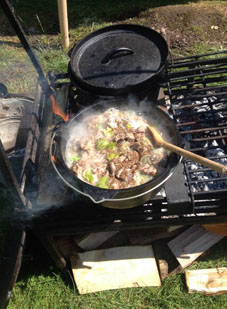A captive audience: cooking at events
We put our money where our mouths are when we say we "learn about history by living it", and nowehere is this more evident than when it comes to foodcatering at events. Our own members will volunteer to plan, research, shop for, and cook everything - breakfast, lunch and dinner - required to make each event a success. Our cooks take pride in serving dishes that are palatable to modern sensibilties while working with medieval recipes and medieval ingredients. Many of our recent new members have confessed to being very pleasantly surprised at just how delicious period food can be, and how special sharing those dishes with good company and fine entertainment. Feasts are usually served in the evening, with candlelight, there are usually two to three courses with planety of differentdishes to try. Many different periods and cultures are explored through their food and ingredients. Don’t worry if you’re not usually adventurous, feasts cater for a wide variety of preferences.
At mealtimes you will need a set of what we call "feastgear". This is a set of medieval appropriate cutlery, drinking vessels and tableware. It is recommended that you bring a bowl as well as a plate/trencher as there are many courses, some of which may be soups or stews. Charity shops are excellent sources for finding pewter drinking vessels,wooden or earthenware dishes and so on, but if you’re unsure and going to an event as a newcomer don’t worry, you can request "loaner feastgear" at most events.
Brewing
Another item you should consider packing in your feast gear is a small tasting vessel. Many of our members will offer tastes of fine drinks and spirits, some of which have been home brewed; these include meads (including melomels (fruit mead) and metaglins (spiced mead), beers and ales, infusions, fruit gins and spiced wines, amoungst others. If you fancy trying the brewing arts yourself you will find no shortage of people pleased to share their recipes - and their favourite stories of the more enthusiastic brews they’ve tried!
Outdoor Camp cooking

They say camping is guaranteed to give anyone great appetite and in Insulae Draconis we know exactly what a hungry camper needs. Even if you’re not spending a weekend under canvas many events include elements of outdoor cooking, for example we’ve had salmon cooked on stakes over a fire for lunch. We’ve had venison, spit roasted under many a blue - and not so blue - sky, wafting delicious aromas to whet many an appetite. At Raglan Castle every year people from all over the Isles camp and cook for ten days with wood fires in fireboxes and some have researched historical pots, fireboxes, cooking irons and will gladly demonstrate to anyone who is interested.
A personal experience
Medieval cookery is one of the things I end up thinking about most. My wife asks, as I stare into space, "What are you thinking about?" and the response is "Well, mostly I was thinking about the way in which al-Warraq calls for meat to be sliced thin - is that for texture, to make sure it's cooked through, or for some aspect of butchery?".
You don't need to go to my level of nerdery, though, to enjoy cookery in the SCA. There are lots of people who like the kitchen because it's a friendly social space, where there are things to be done and there's always some interesting conversation going on. And if you're at one of the camping events, like Ffair Rhaglen, then there'll be several places where people are making food over open fires and with period equipment, so you can go from camp to camp and see what's cooking. There are by now a good number of books of medieval recipes published, so if you just want to get in and make stuff to eat, you can do that. There's also a good-sized community of people who work on interpreting the older recipes, or translating them from other languages, in order to get closer to what was really eaten during the medieval era.
One of the things I really enjoy is taking an ingredient or dish that people don't except to like, and preparing it according to a medieval recipe so that they most definitely do. Most people don't like leeks much, for instance, but I've had the pot of leeks in almond cream literally taken from my hands and carried off to a corner. And the medieval diet is big on good breads, roast meats, and interesting sauces, all of which people react well to. The huzzahs and vivats that the cooks get are usually some of the loudest.
Lord Áodh Ó'Siadhail, Dun in Mara
Practical Tips for Starting with cooking
- If you are at an event find the kitchen and see if they need minions, kitchens are fun to work in as a group activity and you are assured of the head cook’s undying gratitude.
- Our Society prides itself on sharing our skills with others who want to learn. If you like a dish at feast ask the cook about it, they’re usually delighted to share their source material and experiences with you
- There are any number of SCA blogs online where cooks share their research and write up how their dish experiments have gone.
- Check out our how to guides section